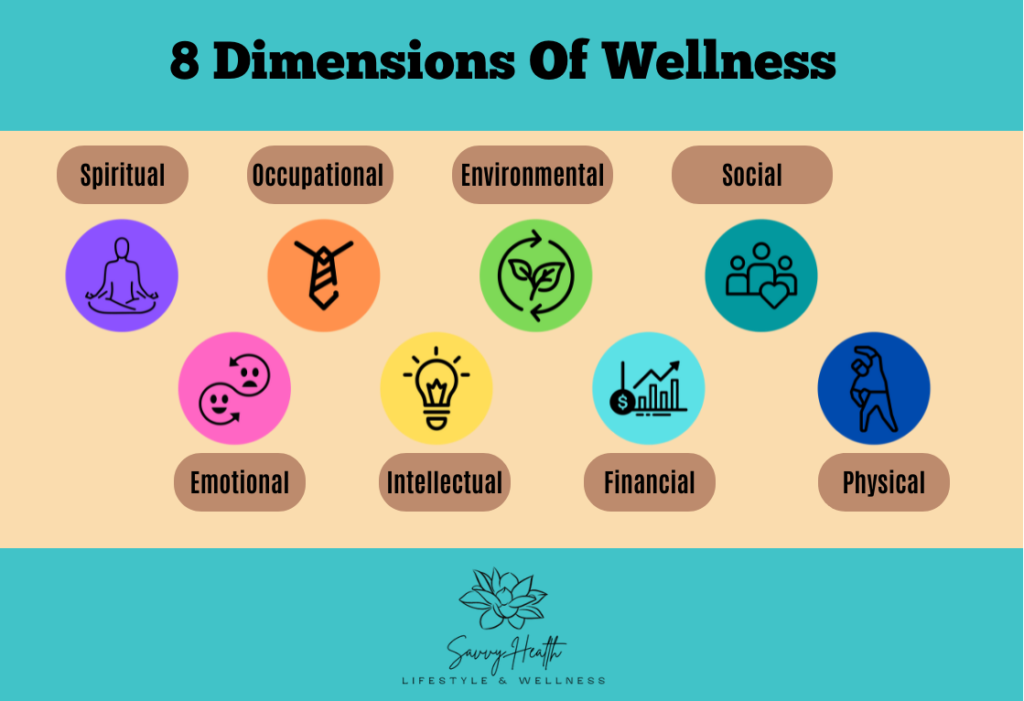A mindset focused on fulfilling the eight dimensions of wellness is crucial in your journey to becoming a better version of yourself.
Wellness refers to your overall health rather than only physical health. Wellness includes:
- Having a purpose in life.
- Being emotionally well
- and physically well.
- Having meaningful relationships.
- Being happy.
It encompasses more than just being disease-free. It is an active process of development and change.
One’s health, well-being, and quality of life will suffer if one of these dimensions is neglected over time. A well-rounded balance of various wellness characteristics provides a holistic harmony to one’s well-being.
Balanced well-being involves the body, mind, and spirit, just as a balanced diet is necessary for good health. This multifaceted approach to wellness emphasizes the value of optimism and constant inspiration for encouraging healthy behaviors to raise one’s quality of life.

Physical
When we think of “health,” our physical state typically comes to mind first. This dimension encompasses the elements that directly affect our physical health. Arguably the foundational dimension of well-being because your physical state influences the other dimension.
Physical wellness consists of taking care of your body to live a long, healthy, and active life. This aspect of well-being necessitates developing healthy behaviors and maintaining them over time.
- Nutrition
Healthful nutrition is essential for our bodies to function. The nutrients in healthy foods, such as spinach or broccoli, are like building blocks our bodies need to repair and generate healthy tissue.
- Exercise
Get regular exercise appropriate for your lifestyle, age, and fitness level. Your heart is a muscle, and regular exercise strengthens it.
- Weight Management
Maintaining a healthy BMI is essential for maintaining good physical fitness. High amounts of adipose tissue (fat) negatively affect one’s health, leading to severe health conditions, including diabetes and heart disease.
- Hygiene
Having adequate hygiene is essential for physical health, including brushing teeth, flossing, and showering.
- Sleep
Sleeping 7 – 9 hours each night allows your body to repair damage and keeps you sharp!
Emotional
Developing awareness and acceptance of your feelings, behaviors, values, and attitudes is a critical component of emotional wellness. It also entails controlling your emotions and respecting others’ sentiments.
It takes practice to become emotionally aware, yet developing this ability can help us take control and recover from challenges in life. Our emotional wellness and general resilience can be improved by regularly practicing self-care, setting reasonable expectations, adopting constructive and healthy coping mechanisms, and nurturing relationships with others.
Emotional wellness includes:
- Having and maintaining healthy relationships
- Expressing your feeling to those your trust
- Having a positive self-image
- Being aware of your feelings.
Social
Making a positive impact on society, connecting with your community, and developing positive relationships with others are all aspects of social wellness. Being conscious of your tastes and background is the first step in achieving this aspect of wellness.
Feelings of belonging and social welfare can be influenced by taking pleasure in social interaction, making enduring friendships, and maintaining good interpersonal relationships. We must respect diversity, be receptive to the social and cultural backgrounds of others and be sensitive to be socially well. This means that we need to be aware of and accepting of diversity.
Social Wellness Includes:
- Maintaining social connection by keeping in touch with others
- Being able to interact with a diverse group of people
- Being able to draw boundaries with yourself and others
- Having good communication skills
- Developing positive relationships
Intellectual
Developing abilities like critical thinking, objective reasoning, problem-solving, and decision-making is related to being intellectually robust. Healthy curiosity, enthusiasm for learning, and a positive attitude toward intellectual difficulties are characteristics of intellectual well-being.
Intellectually strong people are lifelong learners. They seek opportunities to advance their education, careers, and personal lives. Engaging in imaginative, artistic, or creative pursuits is crucial for maintaining good mental health. This aspect of well-being is further strengthened by information sharing through mentoring or teaching others.
Intellectual Wellness Includes:
- Being a lifelong learner
- Learning new skills
- Exercising critical thinking skills
- Challenging yourself mentally
- Having a positive self-image
Financial
Financial wellness involves being able to afford the lifestyle you are living. Budgeting and learning to live within your means are essential components of financial wellness.
You may satisfy short- and long-term demands, fulfill financial commitments, and accomplish reasonable financial goals with sound money management techniques.
The values, beliefs, upbringing, culture, and a host of other characteristics a person possesses can all impact how they feel about money.
Remember that everyone has different financial demands and situations. Financial wellness is more about developing valuable skills and taking action that fits your goals than it is about having money.
Financial wellness involves:
- Being financially literate
- Being financially responsible
- Monitor spending habits
Occupational
Being gainfully employed is a beneficial undertaking because it allows you to support your lifestyle and survival. Although meeting your basic needs for food, water, and shelter is crucial, occupational well-being goes beyond these. It has to do with feeling good about how well you’re doing at work and how far you’ve come.
Aim for career choices that you are passionate about and get ready (through school and work experience) to engage in work that makes meaningful and gratifying use of your abilities and gifts in your judgment.
Occupational wellness includes:
- Developing good work habits and job-related skills
- Setting a career goal that aligns with your desires
- Learning from mistakes and moving forward
- Having a balance of work and leisure
Spiritual
Spiritual well-being can be characterized as looking for motivation, contemplating the meaning of life, or leading a purposeful, intentional existence. This is a private endeavor based on a person’s values and beliefs.
It might or might not involve worship, religious observance, the notion of a higher power, holy rituals, or cultural customs. Some people achieve serenity through mindfulness, yoga, or meditation.
Spiritual Wellness Includes:
- Discovering your values, principles, and beliefs
- Having a greater purpose
- Exploring personal values
- Searching for meaning in your life
Environmental
Consider how your environment affects your well-being and how your presence may impact it. To comprehend environmental wellness, we must consider all the areas we use and appreciate.
This dimension includes the physical environment, social climates, and built environments that shape our daily lives. Your ability to form views and perceptions about the world may be influenced by the interactions between various environments and particular facets of your life.
Environment Wellness Includes:
- Being environmentally aware
- Living in a de-cluttered home
- Having a peaceful home environment
- Being more eco-friendly
- Community Involvement
-
The Myers-Briggs Type Indicator (MBTI): A Powerful Tool For Self Development
One of the most famous psychological tests today is the MBTI inventory. The Myers-Briggs Type Indicator (MBTI) is a self-assessment report designed to identify an individual’s personality type. Based on their research on Carl Jung’s theory of personality types, Isabel Myers and her mother, Katherine Briggs, developed the questionnaire. The Myers & Briggs Establishments that…
-
9 Helpful Tips For Improving Fitness In 2023
Many will begin their fitness journey with the New Year right around the corner. Becoming more active is a great first step toward enjoying all of the incredible benefits of exercise, including improved moods, better sleep, and higher confidence. Whether you’re a beginner or a seasoned fitness guru, allow this guide to help you optimize…
-
What Are Superfoods?
The term superfood refers to foods or food groups high in nutritional benefits while also having minimal calories. They are high in vitamins, minerals, and antioxidants, all essential for metabolism. Antioxidants aid in neutralizing destructive unstable molecules known as free radicals in the body, preventing damage on a cellular level. Antioxidants are linked to preventing…
-
High-Value Mindset: Understanding Yourself and The 8 Dimensions of Wellness
A mindset focused on fulfilling the eight dimensions of wellness is crucial in your journey to becoming a better version of yourself. Wellness refers to your overall health rather than only physical health. Wellness includes: It encompasses more than just being disease-free. It is an active process of development and change. One’s health, well-being, and…
-
7 Tips to Burn Fat and Keep it Off: A Secret Guide
Enter college, I believed I would never become a victim of the notorious “freshman 15,” the weight often gained by students during their first year of college. But three years and a pandemic later, I nearly doubled that weight gain. I became tired quickly, lost focus, and experienced brain fog. I felt terrible and knew…
-
7 Habits For Good Sleep Hygiene To Improve Your Quality of Life
Do you ever lie in bed wondering if you’ll ever fall asleep while staring at the ceiling? Well, you’re not alone. Many people struggle with insomnia. Healthy sleep is crucial for physical and mental well-being, enhancing performance, and general quality of life. Better sleep can benefit everyone, from young children to elderly adults. Environment and habits are…
